Crash Read online
Page 2
Speak, he had to continue speaking. Speech is the fount of reason.
“If we don’t get out of here,” he said, “we are finished.”
Assuming no one came for them. No one had yet.
Talking forced his thoughts to coalesce, cognition forming around language. He marshalled his logic, tried to push past the pain that pulsed in his arm and the deep shivers wracking his body.
He squinted in the gloom at the pods, looking for their numbers – there was something important about the numbers, something that meant a great deal to him. Which number? He craned his neck to peer around the curve of the corridor-turned-shaft. Only on three of the sarcophagi could he see status panels glowing blue. Medical details scrolled over them. The rest were either red or blank, their power gone. In either case, their occupants would be dead. An awful fear filled him.
He thought out to the machines of the deck. His inChip was offline still. Voice, then.
“Activate emergency revivification procedure in all remaining pods,” he called out, as loudly as his neglected vocal cords could manage. There was no response. He tried again, appending his colonist’s rank and identification code to the command.
The woman laughed, a dry, desperate sound. She still made no attempt to move herself or her companion from the fluid. “What are you doing? We’re on emergency lighting. There is nothing to command.”
“The Systems core should function,” said Dariusz.
“Not if we’ve been ejected, it won’t. And we have.”
Dariusz looked at her, his face demanding more. “How can you be sure?”
“I’m a junior ship’s engineer. That’s the only explanation. Each deck has been ejected. We’re not on the ship any more. Don’t you see? We’ve failed.” Her face lost some of its impassivity. A deep tremor ran over her body, interrupting her shivering, and she began to cry.
He attempted to orient himself. There were two exits from each hibernation deck segment, one onto each of the spinal corridors that ran the length of the ESS Adam Mickiewicz. If they had landed so that one door was directly upwards and the other against the ground, they were finished. Was she right? Ejection? If so, why were they not horizontal? A crash, then? Had the whole vessel plunged from the sky? Impossible. The chances of surviving that were minimal. He tried to bring to mind the details of deck ejection, where the doors might be, how it was all supposed to work, but his mind was a shattered mosaic. Frustrated, he banged on a sarcophagus hard with his fist, staring at the woman as if she were to blame.
“We’re dead, we’re all dead,” she moaned.
She put her hands to her face. The man she was holding slipped under the fluid.
“Don’t!” said Dariusz. He pushed off his perch and back into the pool. He fought through it, reaching the other side as the man’s face was going under. He hauled the man up, and pushed him at her. He grabbed at her hands; she fought him with small fists, but he was stronger. When he had her wrists, he moved her arms firmly, wrapping them around the unconscious man’s neck.
He took her face, his fingers distorting her cheeks as she sought to turn away. He looked deep into her eyes.
“Don’t let go. Whatever you do, don’t let go of him.” He looked around. “You have to get out of the fluid or you will get hypothermia. The air is warmer. You will feel better.”
She nodded. She wiped her tears from her eyes with her forearm, leaving a slick of fluid across her cheeks.
They struggled together to get the unconscious man to where Dariusz had been sitting, where they wedged him into place. The deck canted some fifteen degrees off the vertical, and leaned twenty-five degrees off horizontal, further disorienting them. Once the woman was secure also, Dariusz checked the man. He had a pulse, a weak one, but he was alive.
“What is your name?” The words felt odd in his mouth, familiar, but not of his first tongue. There was another language there, a more comfortable one. He did not seek it out.
The woman looked startled to be asked. “Mar... Marina.”
She was not from where he was from; nearly, but not quite. Nations. Different nations.
“You are... Czech?” he guessed. The majority of passengers on the Mickiewicz were central European. They spoke Lingua Anglica to each other, yes. The language he spoke now. He remembered.
“Yes.” In the dark, her eyes appeared unnaturally large.
“Well, Marina, we need to work together, if we are to get out of here alive, okay?”
“There could be anything out there,” she said.
“Maybe,” said Dariusz. “We will not know until we try to get out. Let us worry about one thing at a time. Can we do that?”
He searched his memory. Gaps as wide as the gulfs of space remained. The niggling feeling of responsibility troubled him. He ignored it, searching his scrambled mind for information relevant to survival. “The decks,” he said. “When ejected, they halve, yes?”
The woman nodded. “They split along the join with the spinal corridors, into semicircles. Like half a pineapple ring.”
Dariusz smiled encouragingly. He had not eaten pineapple for years, it was too expensive – had been too expensive, he corrected himself.
“That means,” he said, “that our deck half has come down on one end.”
“It shouldn’t have.” The woman was defensive of the ship.
“It has. One door must be above us.” He spoke aloud, but he was addressing himself more than the woman. “Too risky to try and climb up. The other door?” He looked across the pool to where the woman had been standing. “One of the doors will be under the pool? Right there?” He took one of his hands from her shoulders and pointed.
She nodded again. The liquid was drying to a crust on her skin. She shivered less violently, and her colour was returning in uneven blotches. Her lips, however, remained white. “Maybe we should wait,” she said. “Perhaps someone will come along. We don’t know if we reached our target or not. The air might be poisonous outside, if there’s any air at all.” A deep shudder passed over her.
“We can’t wait. How much air have we got? Do you know?”
“Not much,” she said. “We’ll suffocate. What about the Goethe? When will they come for us?”
“How long have you been awake?”
She shrugged. “Half an hour. Less.”
“And how long do you think we have been down?”
She looked at the emergency light panels. They were growing dim.
“You’re going to try to get out no matter what I say,” she said. Her tears had stopped now. Her eyes were sharper.
“I’d prefer it if you agreed to escape with me.”
She considered a moment, looked around at the dead pods and at the unconscious man. They gave no advice. She bit her lip. “Okay,” she said. “Okay. Under the pool. I’ll tell you what to do.”
Dariusz waded back into the liquid, knocking the corpse of the drowned man. He crouched down, arm extended, searching for the door activation mechanism. After a few moments, he found it. The door control wasn’t working.
“It’s broken.”
“There’s not enough power,” she explained. “We’re on batteries. The lights will go out soon. There is a manual override in a panel underneath. You have to push the top two corners. It should unlock itself.”
Dariusz fumbled about in the muck until he found what he was looking for. He depressed the panel. His fingers were growing numb again. He helped the panel hinge outward and felt inside, where his hand closed around a smooth bar.
“There is a handle,” he said.
“Grab it, twist it ninety degrees clockwise. It is a pump. You have to prime the door pneumatics manually. Five sets of fifteen. There’s a button on the end of the handle.” Marina’s voice was becoming steadier as her role overtook her fear.
“I have it.”
“Whatever you do, don’t press that until you are finished, or you’ll have to start again. It vents the gas,” she explained.
Dariu
sz did as asked. Priming the door was arduous under the liquid, and became harder as he reached the end of the first set. The fifteenth depression rewarded him with a small click.
“The handle has gone slack, have I broken it?”
“No. You’ve primed the first cylinder. The fifteenth depression rotates a new one into place.”
Dariusz continued pumping. Each time, the work grew harder as the pneumatics pressurised, then there was a click and the tension abruptly slackened.
There was a groan behind him.
“How’s he doing?” he said, without looking back.
“He’s warming up and waking. Do you think he is going to be okay?”
“I don’t know, I’m not a medic.”
“Do you think we will be okay?”
Dariusz did not answer, but carried on pumping.
“He looks okay,” said Marina. “At least on the outside.”
“Do you know him?”
“No. Not really,” she said. “I know his face, I think I saw him when we were put under. He wasn’t in any of my training groups.”
By the time Dariusz had the fifth cylinder primed, he was freezing again. On the surfaces around him, the slime was drying to scurf, but the deep puddle would take a long time to warm.
“I’ve done it. Now do I depress the button?”
“Yes.”
“Okay.” Dariusz did so. There was a hiss from the wall, the rough sound of something shifting reluctantly. A ripple appeared in the liquid, then lazily-forming bubbles: first one, then two, then many, blistering the surface with a spawn-like mass. The amniotics began to drain away. Dariusz put his head close to the bubbles and sniffed the air as they burst. There was a scent like cinnamon to it that the smell of the amniotics could not overpower. “I have no idea if this is going to be breathable.”
“What will you do?” said Marina.
No dizziness. No sickness. Nothing. But it was too soon to tell. He felt far from normal, and had nothing reliable to measure the effects of the air against. “I am not dead yet, at least,” he said.
The door stopped opening. Dariusz felt about with his foot.
“It’s about fifteen centimetres open,” he said.
“Well done,” said Marina. “Now, you have to do it all again.” The lights flickered. “We’ll be out of power very soon, each segment has limited battery life. These hibernation units are energy hungry. I better see if there are other survivors. If the machines don’t wake them, they’ll die when the power goes.”
“There are three up there.” Dariusz looked over his shoulder and gestured with his chin. “I couldn’t see if anyone else made it. A lot are smashed or dark.”
Marina nodded quickly. The man moaned softly, and his arm flopped as she wedged him more firmly in place. She stood a moment, figuring out how to ascend to the functioning pods.
The liquid drained away as Dariusz worked, revealing the side and top of the door. By the time he had completed three full priming sequences, the pool had gone.
“Marina!” he called.
“Yes?” Her voice was faint, echoing down to him.
“There’s another sarcophagus here, under the fluid, with a blue status panel.”
“It will have to wait. I’m trying to short the first one into opening. Carry on with the door. Don’t worry, I should be able to get to them all,” she shouted.
Dariusz went back to his work. Loud mechanical sounds came from behind him, then human noises: shouts, a scream. Marina’s voice off in the depths of the segment, more shouts, cries, calming noises from her. A second voice joined her. Conversation. He remained bent to his task.
He performed ten cycles before he realised the door would not open any further. He’d got it about halfway open, wide enough for him to squeeze under. He peered at the gap. He saw coarse sand under a thick coat of the amniotic fluid, a line of sunlight at the top. What the hell had happened? Memories of his prior waking flashed in his mind.
Marina interrupted his train of thought. The remaining puddles of the pseudo-amniotics slurped around her feet as she approached. He turned. The deck’s shadows were thicker, now he had seen the light. The unconscious man was no longer so; he sat upright, cradling his head. Two others stood behind Marina, a man and a woman, leaning on each other for support. Marina held out a jumpsuit and a bottle of isotonic drink to Dariusz in one hand. In the other, she held a tablet, screenglow fuzzy blue.
“You need this,” she said. “You will be dehydrated, and your chemical balance will be off.”
He took the drink without a word and drained it. It tasted disgusting. The other two survivors peered around themselves, wide-eyed and shaking.
“What happened?” the man asked. “Where are we?”
Dariusz ignored them. He brushed the dry amniotics from his body, then struggled into the jumpsuit. The smartcloth adjusted itself to fit, the feet hardened into boots, the cloth cleaned his skin. He felt better for it. “I am going to go outside,” he said.
Marina passed him the tablet. “Use that to gauge the atmosphere. We’ll concentrate on getting the last two pods open. It should not take long.”
Dariusz knelt to scoop sand away from the door, widening the space, and the band of light broadened. He narrowed his eyes against it. A soft wind blew, and the scent of cinnamon grew stronger. He breathed it for a minute. No immediate ill-effects.
“Breathable,” he said with a smile. He judged the hole wide enough, and bent further.
“Don’t go far,” called Marina. “We should stick together.”
He stopped. “I won’t,” he said. He drew in a deep breath. “Okay,” he said. “Okay.” He put his head into the gap under the door and pushed himself through.
It was not so tight a squeeze as he expected. He squirmed up and under the door and out into the sunlight.
He was at the bottom of a trench; banks of loose material, ploughed up by the deck segment, stood two metres over his head. It was hot. The shock of the heat after the chill of the deck made him feel unwell, and he bent and vomited salty drink threaded with amniotic mucus. He had to sit for a moment in the shadow of the sand banks.
It was very quiet. The light breeze carried with it the cinnamon scent. The sky was dazzling blue, slightly different from Earth’s, and the air was thick in his lungs.
The ejected deck segment loomed over him, half a ring thirty metres across, leaning drunkenly into the wind. It had come to rest on one end, the bulk of it arching like the tail of a metal scorpion out of the ground. Feeling a little better, he moved to check the condition of the deck. As far as he could see, it seemed to be intact, so he went around the other side, to where the rockets were, to see if he could discern why it had landed so badly. The sand slipped under his feet as he walked, and he was glad it could not get into his boots. He stepped into the full sunlight, and winced at its strength; the sun was larger than Sol. There was an orange, brassy tint to its light.
He knew then, without any doubt, that this was not Heracles V, the target of their mission.
On the underside of the deck crescent, the funnel mouths of seven rockets protruded. He squinted up at them. Only four of the seven showed signs of firing. They had been lucky to get down in one piece at all.
If this had happened to them, what about the others? There had been seventy-eight hibernation decks on the ESS Adam Mickiewicz, making one hundred and fifty-six segments, if all had ejected. There were thirty-seven ships in the fleet in total, although assuming nothing had gone wrong with them, each would have gone on to its respective target world. But where was the Mickiewicz’s sister ship? The paired craft were not to part for any reason. Evidently they had.
He had to get out of the trench.
Climbing the sand was harder than he expected. The combined effects of hibernation sickness and the heavier gravity left him gasping. The sand cascaded under his hands and feet; he glanced back, worried that he would bring the whole lot down on the door. He lacked the energy to excavate the ro
ute anew. He moved himself along the deck’s flank to where the sandbanks were lower, and used the buried hull to aid his climb, pushing himself up the berm and rolling down the other side. He had to stop once more, but he did not vomit, and the nausea passed quickly. He hauled himself up.
A line of debris stretched all the way to the horizon. Fragments of the ESS Adam Mickiewicz were scattered liberally across the desert. Smaller pieces lay everywhere on the sand as if carefully placed, larger chunks were buried in the ground, and around these the sand was scorched. Half a kilometre away, another deck segment, perhaps the other half of Dariusz’s own, burned ferociously. Over the horizon, pillars of black smoke marred the perfect sky.
Dariusz’s mind convulsed. The world tilted with it, and he fell slowly sideways, demolished by guilt. He had done this.
Something had gone wrong, very wrong, with Browning’s plan.
“What have I done?” he whispered. “What have I done?”
“Anyone who believes in indefinite growth on a physically finite planet is either mad, or an economist.”
– Kenneth Boulding
PART I
Earth
22nd Century
Let’s take a closer look at one of the star systems. This world, orbiting the orange sun Heracles, is typical of the kind of planets the colonists might expect. [A blue world, marbled with cloud, springs to the fore. It is labelled ‘Artist’s Impression’ in text so small it is almost impossible to see.] Orange stars are cooler than our yellow sun, and the Habitable or ‘Goldilocks’ zone – that part of the system where conditions are neither too cold or too hot but just right for life [Reassuring smile in voice.] – is closer to the star than here. Heracles V orbits closer to its star than Earth does, but its position in the area [The planet shrinks, we are tilted on our sides. A top down view of a planetary system spins dizzyingly into place. Twelve worlds orbit it, Heracles V highlighted in green; text boxes scrolling by too fast to read pop in and out of existence around it. The Goldilocks zone blinks in light blue.] is perfect for life to have developed. In fact, scientists have detected possible oxygen traces on three of the moons and worlds in this system also. Long-term studies seem to indicate pretty conclusively that our star system is actually inhospitable when compared to many others.

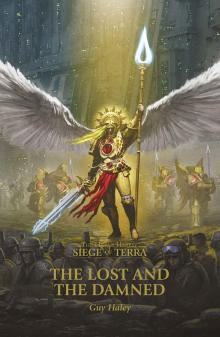 The Lost and the Damned (The Horus Heresy Siege of Terra Book 2)
The Lost and the Damned (The Horus Heresy Siege of Terra Book 2)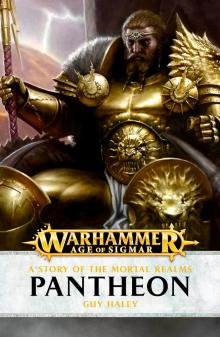 Pantheon
Pantheon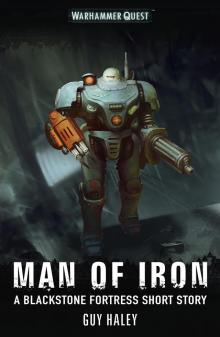 Man of Iron
Man of Iron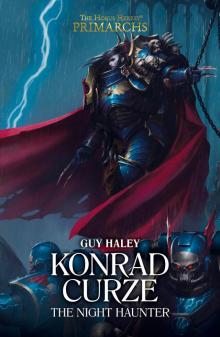 Konrad Curze the Night Haunter
Konrad Curze the Night Haunter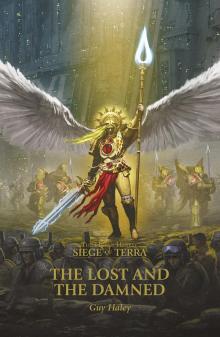 The Lost and the Damned
The Lost and the Damned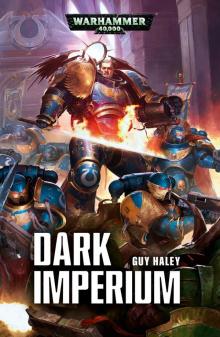 Dark Imperium
Dark Imperium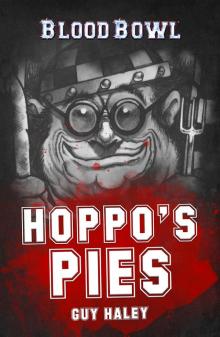 Hoppo's Pies
Hoppo's Pies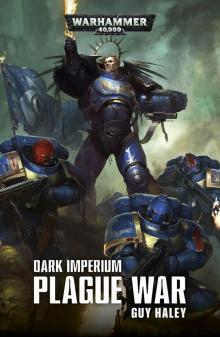 Dark Imperium: Plague War
Dark Imperium: Plague War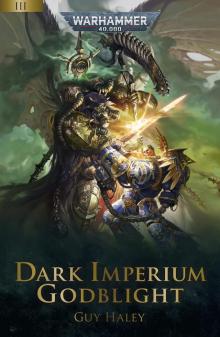 Dark Imperium: Godblight
Dark Imperium: Godblight Crash
Crash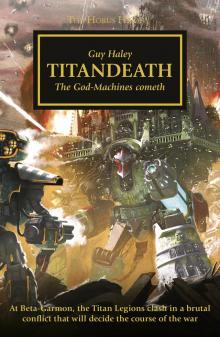 Titandeath
Titandeath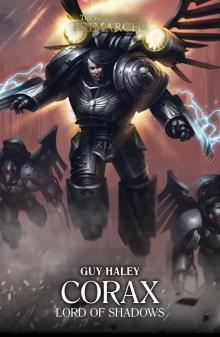 Corax- Lord of Shadows
Corax- Lord of Shadows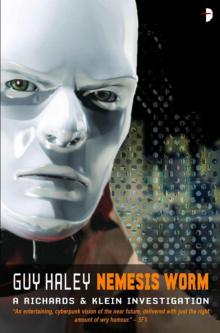 The Nemesis Worm
The Nemesis Worm Wolfsbane
Wolfsbane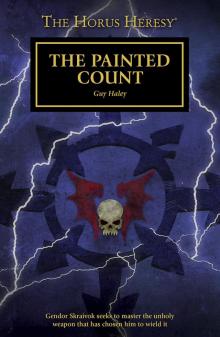 The Painted Count
The Painted Count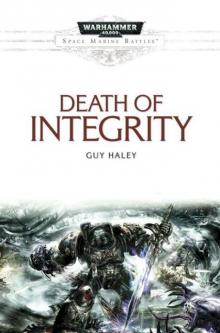 The Death of Integrity
The Death of Integrity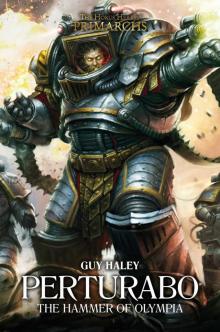 Perturabo: Hammer of Olympia
Perturabo: Hammer of Olympia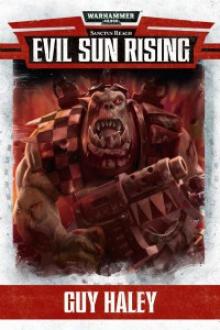 Evil Sun Rising
Evil Sun Rising The Emperor's Railroad
The Emperor's Railroad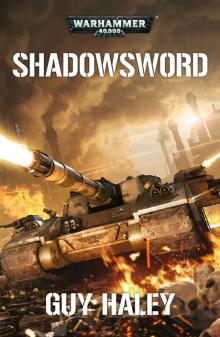 Shadowsword
Shadowsword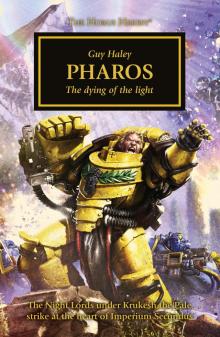 Pharos
Pharos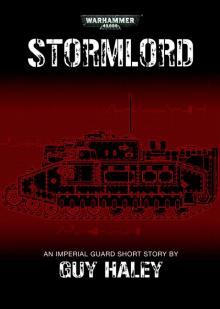 Stormlord
Stormlord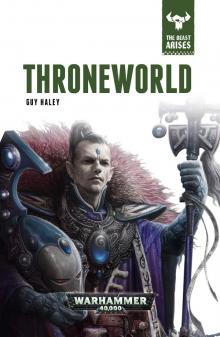 Throneworld
Throneworld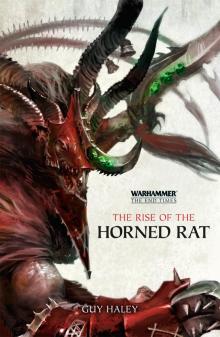 The End Times | The Rise of the Horned Rat
The End Times | The Rise of the Horned Rat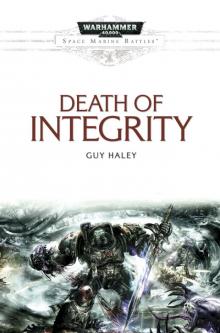 Death of Integrity
Death of Integrity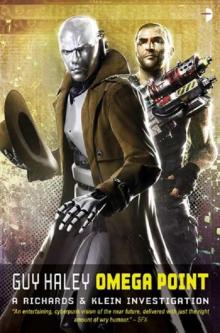 Omega Point
Omega Point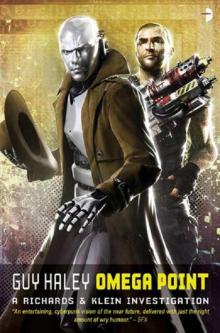 Omega point rak-2
Omega point rak-2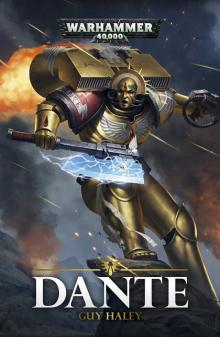 Dante
Dante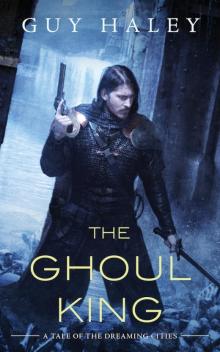 The Ghoul King
The Ghoul King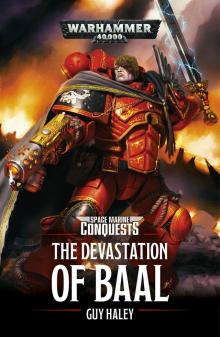 The Devastation of Baal
The Devastation of Baal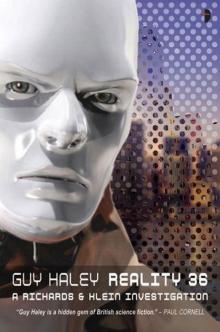 Reality 36: A Richards & Klein Novel
Reality 36: A Richards & Klein Novel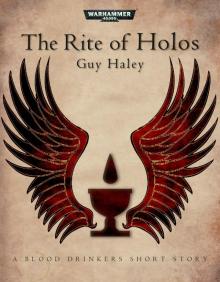 The Rite of Holos
The Rite of Holos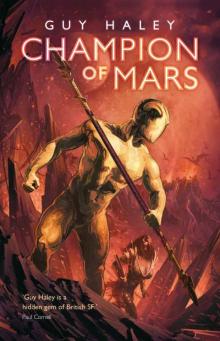 Champion of Mars
Champion of Mars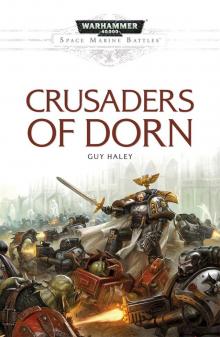 Crusaders of Dorn
Crusaders of Dorn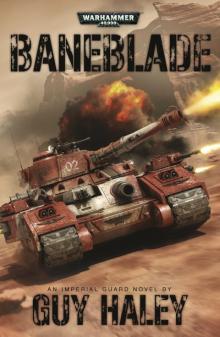 Baneblade
Baneblade